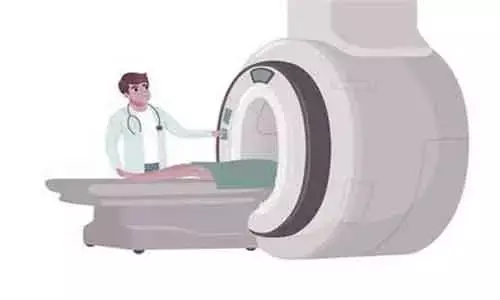- Home
- Medical news & Guidelines
- Anesthesiology
- Cardiology and CTVS
- Critical Care
- Dentistry
- Dermatology
- Diabetes and Endocrinology
- ENT
- Gastroenterology
- Medicine
- Nephrology
- Neurology
- Obstretics-Gynaecology
- Oncology
- Ophthalmology
- Orthopaedics
- Pediatrics-Neonatology
- Psychiatry
- Pulmonology
- Radiology
- Surgery
- Urology
- Laboratory Medicine
- Diet
- Nursing
- Paramedical
- Physiotherapy
- Health news
- Fact Check
- Bone Health Fact Check
- Brain Health Fact Check
- Cancer Related Fact Check
- Child Care Fact Check
- Dental and oral health fact check
- Diabetes and metabolic health fact check
- Diet and Nutrition Fact Check
- Eye and ENT Care Fact Check
- Fitness fact check
- Gut health fact check
- Heart health fact check
- Kidney health fact check
- Medical education fact check
- Men's health fact check
- Respiratory fact check
- Skin and hair care fact check
- Vaccine and Immunization fact check
- Women's health fact check
- AYUSH
- State News
- Andaman and Nicobar Islands
- Andhra Pradesh
- Arunachal Pradesh
- Assam
- Bihar
- Chandigarh
- Chattisgarh
- Dadra and Nagar Haveli
- Daman and Diu
- Delhi
- Goa
- Gujarat
- Haryana
- Himachal Pradesh
- Jammu & Kashmir
- Jharkhand
- Karnataka
- Kerala
- Ladakh
- Lakshadweep
- Madhya Pradesh
- Maharashtra
- Manipur
- Meghalaya
- Mizoram
- Nagaland
- Odisha
- Puducherry
- Punjab
- Rajasthan
- Sikkim
- Tamil Nadu
- Telangana
- Tripura
- Uttar Pradesh
- Uttrakhand
- West Bengal
- Medical Education
- Industry
Low-cost, portable MRI scanner developed for brain imaging

BOSTON- Access to scanners for magnetic resonance imaging (MRI) is typically limited by cost and by infrastructure requirements.
Investigators at Massachusetts General Hospital (MGH) have developed a low-cost, compact, portable and low-power "head only" MRI scanner that could be mounted in an ambulance, wheeled into a patient's room, or put in small clinics or doctors' offices around the world. The advance is described in a study published in Nature Biomedical Engineering.
Magnetic resonance imaging (MRI) is the best option for brain scans for assessing head trauma, detecting brain cancer, and performing numerous other tests. But MRI scanners are costly, require special infrastructure, and are immobile.
"Although MRI is the premier imaging modality for brain imaging, the purchase and installation of traditional high-field MRI scanners can be prohibitively expensive and difficult," says lead author Clarissa Zimmerman Cooley, PhD, an investigator in Radiology at MGH's Athinoula A. Martinos Center for Biomedical Imaging. "Even in a hospital where MRI scanners are available, there are cases where it may be too difficult or dangerous to transport the patient to scanner suites. The work in this paper was really motivated by this need for more accessible MRI."
Cooley and her colleagues designed and tested a portable prototype scanner for brain MRI that can be plugged into a standard outlet and emits much less noise than traditional MRI scanners. The magnet itself is about the size of a laundry basket, and the total weight of the full scanner system (including the magnet, coils, amplifiers, console and cart) is 230kg, or about 500 pounds, and the cart can be pushed by a single person for transport. If the standard equipment components are replaced with custom efficient lightweight designs, the total weight could be reduced to 160 kg, or approximately 350 pounds.
When tested in three healthy adult volunteers, the scanner generated 3D brain images, typically within 10 minutes.
"This type of technology could really extend the reach of MRI," says Cooley. "With some further development, this could allow truly point-of-care, bedside brain imaging for patients or scanning in remote locations, where MRI has traditionally been unavailable."
http://dx.doi.org/10.1038/s41551-020-00641-5
Hina Zahid Joined Medical Dialogue in 2017 with a passion to work as a Reporter. She coordinates with various national and international journals and association and covers all the stories related to Medical guidelines, Medical Journals, rare medical surgeries as well as all the updates in the medical field. Email: editorial@medicaldialogues.in. Contact no. 011-43720751
Dr Kamal Kant Kohli-MBBS, DTCD- a chest specialist with more than 30 years of practice and a flair for writing clinical articles, Dr Kamal Kant Kohli joined Medical Dialogues as a Chief Editor of Medical News. Besides writing articles, as an editor, he proofreads and verifies all the medical content published on Medical Dialogues including those coming from journals, studies,medical conferences,guidelines etc. Email: drkohli@medicaldialogues.in. Contact no. 011-43720751


